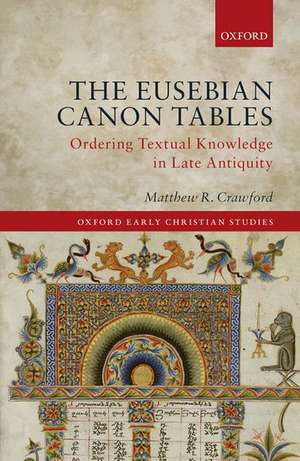The Eusebian Canon Tables: Ordering Textual Knowledge in Late Antiquity: Oxford Early Christian Studies
Autor Matthew R. Crawforden Limba Engleză Hardback – 6 mai 2019
Din seria Oxford Early Christian Studies
- 17%
 Preț: 582.40 lei
Preț: 582.40 lei - 30%
 Preț: 504.66 lei
Preț: 504.66 lei - 28%
 Preț: 437.72 lei
Preț: 437.72 lei - 17%
 Preț: 582.12 lei
Preț: 582.12 lei - 19%
 Preț: 497.45 lei
Preț: 497.45 lei - 30%
 Preț: 491.67 lei
Preț: 491.67 lei - 25%
 Preț: 568.80 lei
Preț: 568.80 lei - 30%
 Preț: 627.90 lei
Preț: 627.90 lei - 17%
 Preț: 581.27 lei
Preț: 581.27 lei - 12%
 Preț: 616.72 lei
Preț: 616.72 lei - 27%
 Preț: 573.73 lei
Preț: 573.73 lei - 30%
 Preț: 500.48 lei
Preț: 500.48 lei - 30%
 Preț: 542.84 lei
Preț: 542.84 lei - 30%
 Preț: 528.78 lei
Preț: 528.78 lei - 18%
 Preț: 252.05 lei
Preț: 252.05 lei - 26%
 Preț: 517.83 lei
Preț: 517.83 lei - 26%
 Preț: 598.30 lei
Preț: 598.30 lei - 30%
 Preț: 820.42 lei
Preț: 820.42 lei - 34%
 Preț: 1036.50 lei
Preț: 1036.50 lei - 30%
 Preț: 1107.11 lei
Preț: 1107.11 lei - 22%
 Preț: 361.61 lei
Preț: 361.61 lei - 34%
 Preț: 1327.96 lei
Preț: 1327.96 lei - 9%
 Preț: 255.03 lei
Preț: 255.03 lei - 34%
 Preț: 1123.50 lei
Preț: 1123.50 lei - 34%
 Preț: 845.94 lei
Preț: 845.94 lei - 14%
 Preț: 449.09 lei
Preț: 449.09 lei - 34%
 Preț: 1195.96 lei
Preț: 1195.96 lei - 22%
 Preț: 391.93 lei
Preț: 391.93 lei - 34%
 Preț: 1033.77 lei
Preț: 1033.77 lei - 34%
 Preț: 1255.62 lei
Preț: 1255.62 lei - 34%
 Preț: 819.81 lei
Preț: 819.81 lei - 19%
 Preț: 293.42 lei
Preț: 293.42 lei - 34%
 Preț: 1761.02 lei
Preț: 1761.02 lei - 34%
 Preț: 1725.86 lei
Preț: 1725.86 lei - 30%
 Preț: 947.60 lei
Preț: 947.60 lei - 34%
 Preț: 888.89 lei
Preț: 888.89 lei - 30%
 Preț: 1006.79 lei
Preț: 1006.79 lei - 30%
 Preț: 835.47 lei
Preț: 835.47 lei - 30%
 Preț: 1415.68 lei
Preț: 1415.68 lei - 34%
 Preț: 1199.53 lei
Preț: 1199.53 lei - 34%
 Preț: 756.41 lei
Preț: 756.41 lei - 34%
 Preț: 1107.76 lei
Preț: 1107.76 lei - 34%
 Preț: 872.81 lei
Preț: 872.81 lei - 34%
 Preț: 1446.26 lei
Preț: 1446.26 lei - 28%
 Preț: 338.52 lei
Preț: 338.52 lei - 34%
 Preț: 2061.53 lei
Preț: 2061.53 lei - 31%
 Preț: 1036.54 lei
Preț: 1036.54 lei - 34%
 Preț: 890.06 lei
Preț: 890.06 lei
Preț: 706.02 lei
Preț vechi: 882.90 lei
-20% Nou
Puncte Express: 1059
Preț estimativ în valută:
135.09€ • 141.05$ • 111.81£
135.09€ • 141.05$ • 111.81£
Carte disponibilă
Livrare economică 03-10 martie
Preluare comenzi: 021 569.72.76
Specificații
ISBN-13: 9780198802600
ISBN-10: 0198802609
Pagini: 394
Dimensiuni: 161 x 243 x 26 mm
Greutate: 0.82 kg
Editura: OUP OXFORD
Colecția OUP Oxford
Seria Oxford Early Christian Studies
Locul publicării:Oxford, United Kingdom
ISBN-10: 0198802609
Pagini: 394
Dimensiuni: 161 x 243 x 26 mm
Greutate: 0.82 kg
Editura: OUP OXFORD
Colecția OUP Oxford
Seria Oxford Early Christian Studies
Locul publicării:Oxford, United Kingdom
Recenzii
... this book offers a wonderfully detailed introduction to the development and reception of the Eusebian Canon Tables, and superbly fills a major lacuna in the scholarly study of the fourfold Gospel canon.
A book covering a rare crossover if an information technology from one domain to another in antiquity
Crawford has written a splendid and erudite book about Eusebius's Canon Tables, an oft-neglected feature of ancient gospel manuscripts.
The 52 high-resolution photographs of ancient texts and images result in a book so beautiful that readers will be hesitant to highlight the text or add notes in the margin. It breaks new ground in several areas that will be helpful even to scholars who have done extensive work with the canon tables... it is an indispensable guide to any scholarly study of the Eusebian canon tables.
This book will become the launching pad for all studies of the Canon Tables for many years to come. Crawford is adept both at working through complicated and detailed material, and then laying out clearly and simply for the reader as well as at providing the big-picture overview.
Meticulously documented and richly illustrated, [Crawford]'s book on the Eusebian Canon Tables represents a milestone of scholarship, the touchstone for all future studies on the topic.
A book covering a rare crossover if an information technology from one domain to another in antiquity
Crawford has written a splendid and erudite book about Eusebius's Canon Tables, an oft-neglected feature of ancient gospel manuscripts.
The 52 high-resolution photographs of ancient texts and images result in a book so beautiful that readers will be hesitant to highlight the text or add notes in the margin. It breaks new ground in several areas that will be helpful even to scholars who have done extensive work with the canon tables... it is an indispensable guide to any scholarly study of the Eusebian canon tables.
This book will become the launching pad for all studies of the Canon Tables for many years to come. Crawford is adept both at working through complicated and detailed material, and then laying out clearly and simply for the reader as well as at providing the big-picture overview.
Meticulously documented and richly illustrated, [Crawford]'s book on the Eusebian Canon Tables represents a milestone of scholarship, the touchstone for all future studies on the topic.
Notă biografică
Matthew R. Crawford is an Associate Professor and Director of the Program in Biblical and Early Christian Studies in the Institute for Religion and Critical Inquiry at Australian Catholic University. From 2012 to 2015 he held an AHRC-funded postdoc at Durham University on canonical and non-canonical gospel literature, and from 2013 to 2015 a Junior Research Fellowship from Hatfield College. He is the author of Cyril of Alexandria's Trinitarian Theology of Scripture (2014).
